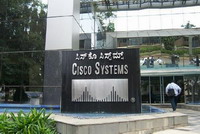United Nations to cooperate with Google Inc and Cisco Systems Inc to fight poverty
The United Nations, Google Inc. and Cisco Systems, Inc. to launch a new Web site that will provide data and a bird's eye view of global efforts to fight poverty and meet U.N. development goals.

The site will track efforts by countries around the globe to achieve the Millennium Development Goals for 2015, which world leaders approved at a U.N. summit in 2000, by providing the latest statistics on health, education, malnutrition, women's equality and other measures that contribute to poverty.
On one portion of the site, a Web surfer can also use Google Earth's map and satellite imagery to fly anywhere on the planet and explore from above the places where work is being done.
The goals include cutting extreme poverty by half, ensuring universal primary school education, reducing child mortality by two-thirds, halting and starting to reverse the HIV/AIDS pandemic and cutting in half the proportion of people without access to safe drinking water.
U.N. Secretary-General Ban Ki-moon called Thursday's launch "crucial" because for the first time all information on the U.N. goals, known as the MDGs, will be available in one place "for all who seek it, with a few simple clicks of the mouse."
Ban lamented that almost one billion people still live on less than one dollar a day; that millions of children die every year before their fifth birthday from causes associated with malnutrition; that infectious diseases including AIDS and malaria "are taking their worst toll on countries that can least afford it;" and that millions of people are living in slums.
"Clearly, we are facing a development emergency - and we need emergency action," he said.
"For the first time in history, the world has at its disposal the means to cut poverty in half in the span of a generation," the secretary-general said. "But ultimately, achieving the MDGs is a matter of political will. There is no silver bullet, but the resources, knowledge and tools for achieving the goals do exist."
The new MDG Monitor is one of those tools because it will harness the power of the Internet to provide information for policymakers and development experts who can learn from each other's successes and setbacks, and it will increase public access and attention to achieving the U.N. goals, Ban said.
At the end of his speech, Ban put his hand on the mouse of a laptop computer together with Cisco Senior Vice President Carlos Dominguez, Google's Michael Jones who is chief technologist for Google Earth and Maps, and U.N. Development Program Administrator Kemal Dervis.
A user who clicks the Google Earth logo can fly anywhere in the world and see all the projects and assess the progress toward meeting the MDGs, Jones said.
"They can see successes and celebrate those, and observe failures or shortfalls ... and redouble their country's commitment to pursue those efforts. So it's very exciting for us," he said.
Dominguez said Cisco believes that technology and human ingenuity "can effectively guide expertise and resources to those in need while highlighting the success of others in reaching these important goals."
The budget for the project is $200,000, and it received $150,000 from corporate donors, according to the U.N. Development Program, which is facilitating the new Web site for the U.N.
UNDP's Dervis said data on the MDG Monitor comes from a variety of U.N. agencies, the World Bank and governments, but he noted that statistics are sometimes difficult to obtain, and can differ.
"We hope to gradually overcome these weaknesses and open the site to all organizations who gather statistics to offer their information," he said.
Subscribe to Pravda.Ru Telegram channel, Facebook, RSS!


